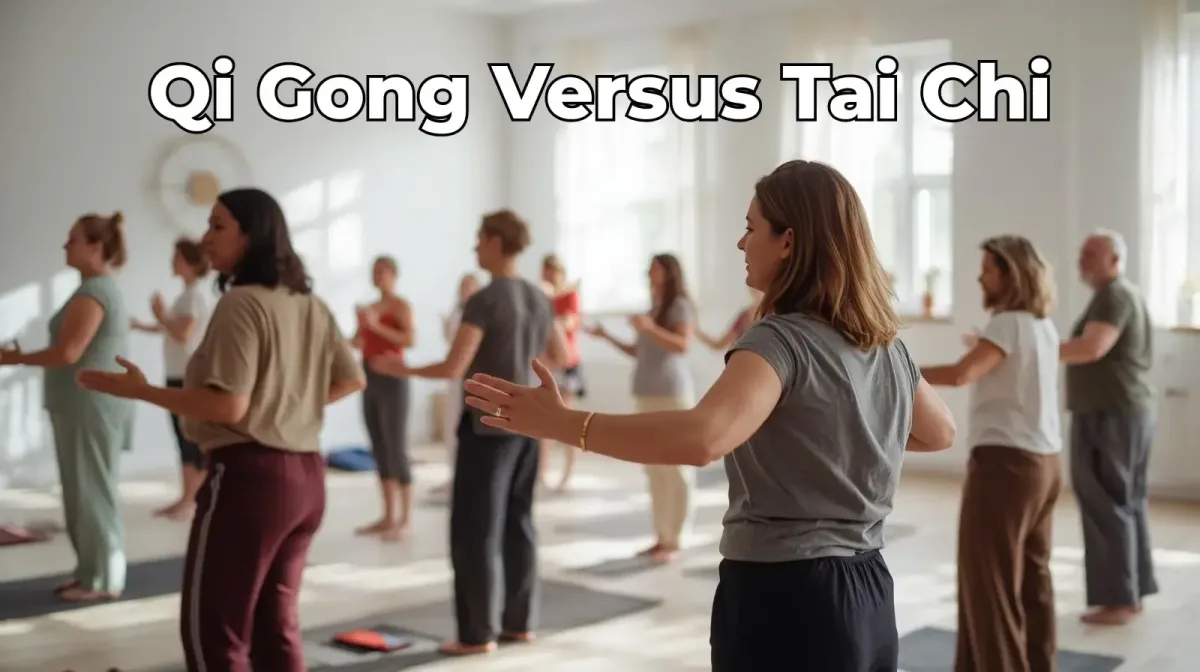
Qi Gong vs Tai Chi in Kingston & Surbiton: Which is Best for You?
If you live in Kingston upon Thames, Surbiton, Thames Ditton, or Long Ditton, you may have noticed plenty of classes for Tai Chi. At the same time, you might have come across Qi Gong and wondered what sets it apart.
Both practices come from ancient traditions rooted in movement, mindfulness, and energy awareness. Both can help improve health, balance, and peace of mind. But they are not the same. Understanding the difference will help you decide which path is right for you.
What is Tai Chi?
Tai Chi began in China as a martial art and has evolved into a gentle exercise form, with slow, flowing movements. In most Tai Chi classes, you learn set sequences or “forms” that can take months, even years, to memorise and refine.
It’s a beautiful practice and deeply beneficial for balance, coordination, and discipline. But for some, especially beginners, the learning curve can feel steep. Tai Chi often requires a good memory and regular repetition to really sink in.
What is Qi Gong?
Qi Gong, sometimes written as Chi Kung, is a more flexible approach to energy practice. Instead of memorising long sequences, you repeat simple, flowing movements while focusing on breath and awareness.
At our Awaken the Energy Within Workshop, we practise Korean-style Qi Gong. This style is designed to be highly accessible for beginners, with movements that feel natural and easy to follow. But don’t mistake simplicity for shallowness. Korean-style Qi Gong is also rich in depth, offering new insights and challenges for even the most experienced students.
As Christine Weston, one of our participants, shared:
“The workshop on Sunday was really good, really enjoyed it. I was amazed at how relaxed and calm I felt. After the whole session finished, I felt so empty, as if a weight had been lifted off me. Completely looking forward to the next workshop.”
The Main Differences Between Tai Chi and Qi Gong
While both Qi Gong and Tai Chi are slow, mindful practices, their focus is different. Tai Chi is rooted in martial arts and often requires structured, choreographed movements. Qi Gong, on the other hand, is about energy cultivation and inner healing, with exercises that are shorter, simpler, and easier to remember.
Tai Chi is excellent if you’re drawn to learning forms and enjoy steady, precise progress. Qi Gong is ideal if you want to relax quickly, reduce stress, and feel results from the very first session. That’s why so many people in Kingston, Surbiton, and Thames Ditton find Qi Gong a more approachable way to begin their journey into mindful movement.
Why Choose Korean-Style Qi Gong in Kingston and Surbiton?
Our workshops combine Qi Gong with sound healing and meditation, creating a powerful experience of both movement and stillness.
Accessible venue: We meet at Long Ditton Village Hall (KT6), just minutes from Surbiton and Kingston.
Welcoming atmosphere: Our sessions attract people of all ages and abilities, from complete beginners to seasoned practitioners.
Holistic approach: You don’t just learn Qi Gong — you experience energy work, chakra opening, and deep relaxation through sound.
As Janet Atkins reflected after attending:
“Peter’s workshop was excellent. The Qi Gong was amazing and made me aware of areas of my body that were tight. The sound healing and opening of the chakras was amazing. Three hours passed by so quickly. I felt refreshed afterwards and slept so well that night.”
Where to Learn Qi Gong Locally
If you’re curious to try Qi Gong, a good starting point is our Qi Gong in Long Ditton (KT6): Local Guide, which covers everything you need to know.
If you’re completely new, the Beginner’s Qi Gong Checklist for Kingston will help you prepare for your first class.
For those interested in how Qi Gong helps with balance and mobility, take a look at Qi Gong for Seniors in Kingston & Surbiton.
Adding Sound Healing to the Mix
One of the unique aspects of our workshops is the integration of sound healing. After the Qi Gong practice, participants enjoy deep relaxation through gongs, bowls, and vocal toning. This combination enhances the effects of the movements, helping you release tension and reconnect with stillness.
If you’d like to learn more about this part of the experience, see our article on Gong Bath vs Sound Bath in Kingston.
FAQs on Qi Gong vs Tai Chi
Which is easier for beginners?
Qi Gong is usually easier to start with, especially the Korean style we practise, because the movements are simple and can be repeated without needing to memorise long sequences.
Does Tai Chi have benefits Qi Gong doesn’t?
Tai Chi can be excellent for coordination, discipline, and learning traditional martial art forms. Qi Gong, by contrast, focuses more directly on energy flow, relaxation, and stress relief.
I’ve done Tai Chi before — should I try Qi Gong?
Yes. Many Tai Chi practitioners find Qi Gong helps them connect more deeply to their energy and enhances their Tai Chi practice.
Where can I try Qi Gong near Kingston and Surbiton?
You can join us at the Awaken the Energy Within Workshop in Long Ditton. It’s a short trip from Kingston, Surbiton, and Thames Ditton.
In Conclusion
If you’re deciding between Tai Chi and Qi Gong, think about your goals. If you want a structured martial art with memorised forms, Tai Chi could be your choice. If you’d like a more accessible entry point that brings immediate relaxation, stress relief, and energy balance, then Korean-style Qi Gong is the perfect starting place.
The best way to find out is to experience it for yourself. Join us at the Awaken the Energy Within Workshop and explore the benefits firsthand.

I look forward to connecting with you in the next post.
Until then, be well and keep shining,
Peter. :)
